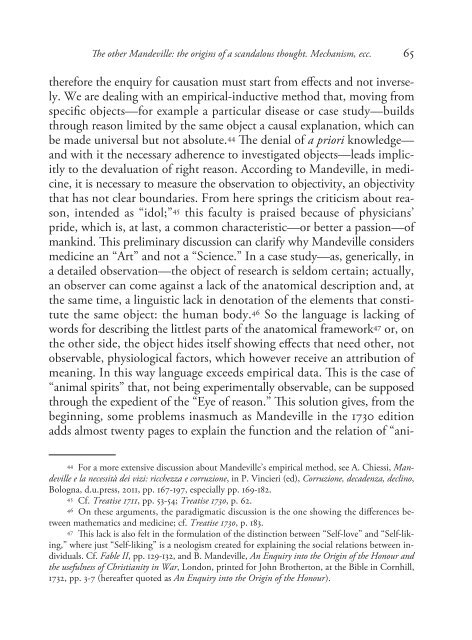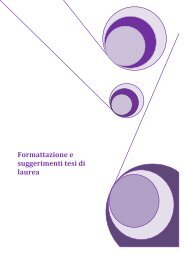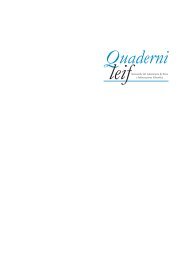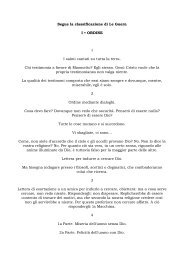qui - maria vita romeo
qui - maria vita romeo
qui - maria vita romeo
Create successful ePaper yourself
Turn your PDF publications into a flip-book with our unique Google optimized e-Paper software.
e other Mandeville: the origins of a scandalous thought. Mechanism, ecc. 65<br />
therefore the en<strong>qui</strong>ry for causation must start from effects and not inversely.<br />
We are dealing with an empirical-inductive method that, moving from<br />
specific objects—for example a particular disease or case study—builds<br />
through reason limited by the same object a causal explanation, which can<br />
be made universal but not absolute. 44 e denial of a priori knowledge—<br />
and with it the necessary adherence to investigated objects—leads implicitly<br />
to the devaluation of right reason. According to Mandeville, in medicine,<br />
it is necessary to measure the observation to objectivity, an objectivity<br />
that has not clear boundaries. From here springs the criticism about reason,<br />
intended as “idol;” 45 this faculty is praised because of physicians’<br />
pride, which is, at last, a common characteristic—or better a passion—of<br />
mankind. is preliminary discussion can clarify why Mandeville considers<br />
medicine an “Art” and not a “Science.” In a case study—as, generically, in<br />
a detailed observation—the object of research is seldom certain; actually,<br />
an observer can come against a lack of the anatomical description and, at<br />
the same time, a linguistic lack in denotation of the elements that constitute<br />
the same object: the human body. 46 So the language is lacking of<br />
words for describing the littlest parts of the anatomical framework 47 or, on<br />
the other side, the object hides itself showing effects that need other, not<br />
observable, physiological factors, which however receive an attribution of<br />
meaning. In this way language exceeds empirical data. is is the case of<br />
“animal spirits” that, not being experimentally observable, can be supposed<br />
through the expedient of the “Eye of reason.” is solution gives, from the<br />
beginning, some problems inasmuch as Mandeville in the 1730 edition<br />
adds almost twenty pages to explain the function and the relation of “ani-<br />
44 For a more extensive discussion about Mandeville’s empirical method, see A. Chiessi, Mandeville<br />
e la necessità dei vizi: ricchezza e corruzione, in P. Vincieri (ed), Corruzione, decadenza, declino,<br />
Bologna, d.u.press, 2011, pp. 167-197, especially pp. 169-182.<br />
45 Cf. Treatise 1711, pp. 53-54; Treatise 1730, p. 62.<br />
46 On these arguments, the paradigmatic discussion is the one showing the differences between<br />
mathematics and medicine; cf. Treatise 1730, p. 183.<br />
47 is lack is also felt in the formulation of the distinction between “Self-love” and “Self-liking,”<br />
where just “Self-liking” is a neologism created for explaining the social relations between individuals.<br />
Cf. Fable II, pp. 129-132, and B. Mandeville, An En<strong>qui</strong>ry into the Origin of the Honour and<br />
the usefulness of Christianity in War, London, printed for John Brotherton, at the Bible in Cornhill,<br />
1732, pp. 3-7 (hereafter quoted as An En<strong>qui</strong>ry into the Origin of the Honour).








